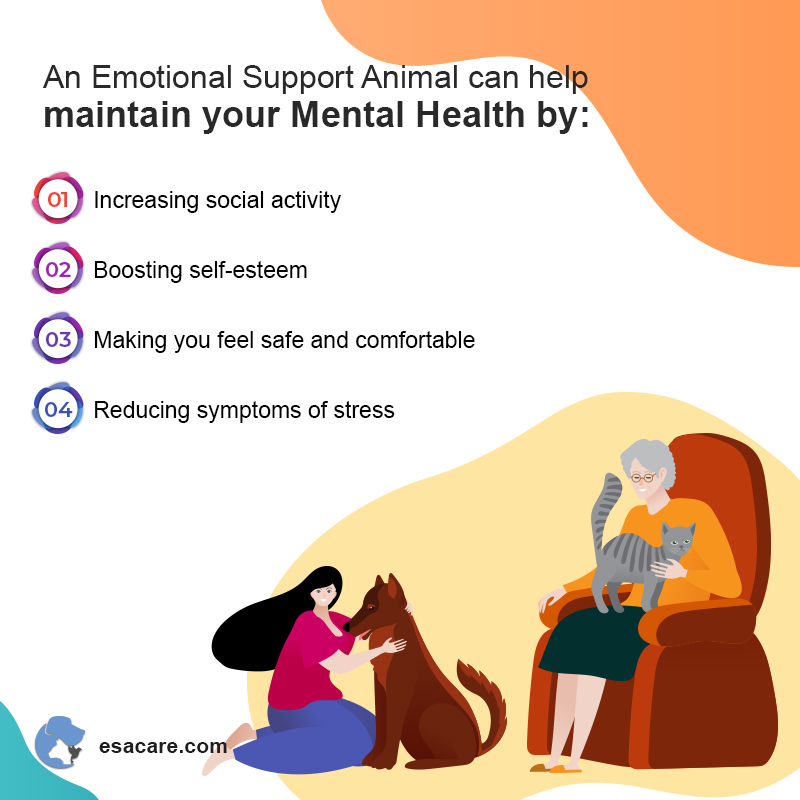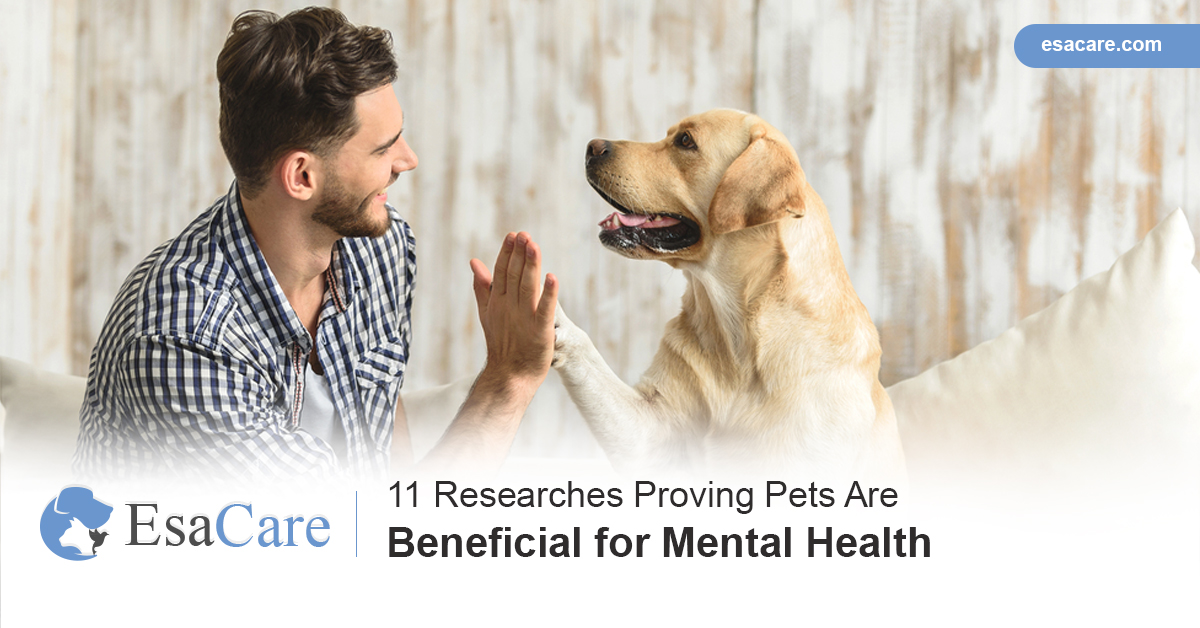11 Researches Proving Pets Are Beneficial for Mental Health
Everybody needs support in one way or another. That is why people sometimes turn to different environments, people, and substances for support. Without the necessary support, an individual may struggle to find a mental and emotional balance. So, how do you gain support and companionship in modern-day life? The simple answer may lie in pets. Considerable research conducted in this field shows how a connection exists between pets and mental health. Therefore, it is essential to take care of your dog mental health, and you may need to consider an expert for devising an authentic pets health care plan for your dog.
An ESA pet can improve your lifestyle – Click the button below.
Below are 11 kinds of research that show the positive effects of owning a pet:
Table of Contents
Number One: Pets Are Good for Mental Health of ‘Everyday People’
According to a study conducted by the American Psychological Association (APA), pets are just as important as friends. The publication, released in July 2011, showed that pets support mental health and emotional stability amongst all people, and these Emotional Support Animals aren’t limited to only those facing health challenges.
Methodology
In this study, psychologists at Miami University and Saint Louis University did three experiments. Chiefly, the psychologists aimed to find a positive connection between pets and everyday people. The three sample groups included 217 people with and without pets, 56 people with dogs as their pets, and 97 undergraduate students.
Results
The first group, which consisted of people with and without pets, filled out a survey. In the survey, they focused on the impact of having pets in their lives. And from the results collected, the group that owned pets fared better. In terms of well-being and happiness, the pet owners were more physically fit and less lonely. Also, the group that owned pets proved to adjust better than those without pets.

People Living With Different Animals
The group of dog owners focused on their mental well-being. In this group, the psychologists wanted to determine whether the owners benefited more when their pets helped with their social needs. From the results gathered, a sense of belonging, self-esteem, and meaningful existence was considerably higher.
After gathering results, the psychologists found out that pets helped the students deal with rejection better. The students were to write about their experience with exclusion and their friends. From the essays, the students said that writing about their pets was as effective as writing about their friends.
Conclusion
Owning a pet is not age-restricted. From the older individuals to the campus students, pets improve the mental and emotional health of the subject.
Overcome anxiety with your ESA pet – Click the button below.
Number Two: The Power of Pets: Health Benefits of Human-Animal Interactions
Another study published in February 2018 by NIH sought to understand who benefits from owning a pet and which animals were most suitable for health benefits.
Methodology
In collaboration with Mars’ Corporation’s WALTHAM, researchers from NIH researched animal interaction with kids dealing with ADHD, autism, and other conditions. They also studied the interaction between pets and people with terminal and mental health illnesses.
Results
The study found a relationship between owning animals, and cortisol, a stress-related hormone. When humans interacted with animals, cortisol production decreased, which lowered their stress levels and increased alertness.

ESA Pet Keeps You Mentally Fit
How do pets Help with Stress?
Pets help you focus. And if you are stressing, they make you happy. When dealing with stress, the body triggers endorphins release, a hormone responsible for making you happy. Owning a pet helps distract you from the negative and stressful events you encounter during day-to-day interactions.
The results also showed a decrease in blood pressure and loneliness—while indicating a boost in moods and feelings of social support.
According to the research, different people benefited differently from owning a pet. For some, it was walking the dog that increased their physical activities. Other pet owners experienced calmness after watching their fish swim, hence reducing stress. In some cases, students with ADHD used dogs to help them concentrate in their classrooms.
Conclusion
Pets improve stress management and help in mental development. Most importantly, pets offer unconditional love, which does more than offering companionship. Therefore, pet-owners stay happy and have a better experience with social interactions.
Book an Appointment by clicking the banner below.
Number Three: Power of Support from Companion Animals
The number of people struggling with mental health conditions in the US is increasing daily. Researchers are actively looking for ways to improve this situation. One solution the psychiatrists are looking into is owning a pet.
This study, published in the BMC Psychiatry, aimed to observe the impact of pets on the lives of people living with mental health issues. The study delved into the nature, extent, and impact of pets on a subject’s mental health.
Researchers focused their attention on two questions:
- What are the nature, quality, and extent of evidence pointing to pets playing any role in people’s mental health conditions with or without comorbid physical health conditions?
- What mechanisms are known to aid this impact?
Methodology
This research sourced 9 databases for information regarding companion animals’ role for people living with mental health issues. The research focused mainly on people with diagnosable mental health conditions and their relationship to domestic animals.

Impact of an ESA on Mentally Disturbed Person
Results
From the 17 studies collected from the database, there was qualitative evidence pointing to pet ownership benefits. The psychiatrists found that pets played a vital role in the work linked to better mental health, especially during a crisis. These pets provide emotional support and ward off any feelings of being lonely.
Pets live with their owners 24/7. With their developed sixth sense, they can sense the emotional condition of their owners. Once they sense any disruptions, they come to your aid and shower you with their unconditional affection. And that is one way to improve your moods, deal with stress, and support you need to stay happy.
Conclusion
The research results showed that pets play an essential role in the lives of people living with mental health issues. The intensity of the connection between pets and their owners’ mental health was enough to draw this conclusion.
ESA pet can be a great companion during a mental breakdown – Click the button below.
Number Four: The Benefits of Pets and Animal-Assisted Therapy
According to the Hindawi Journal, close to two-thirds of American households own a pet. Almost half of these homes belong to elderly individuals. The research aimed at trying and find the potential benefits of pets to older individuals.
Methodology
The Hindawi study aimed at establishing a connection between pets and mental health. The sample group involved in the research consisted of participants who manifested cognitive impairment and those who didn’t. Different pets were used, including cats, dogs, fish, birds, and robotic simulations of animals.
Part of the study involved studying seniors who interacted with pets and those who did not.
Results
- People Without Impairment
A group of 114 seniors had a different task. Some were provided a pet bird to take care of; others were to take care of a plant, while the last group had no charge for three months.
The group with the bird and plant were graded, and from the result, seniors with the bird performed better than the other two groups.
- People with Dementia
This group used a dog as a trigger for socialization. Of the 12 seniors involved in this study, there was an increase in social behaviors. They smiled and spoke in the presence of the dog. This behavior implied that the animals created benefits that extended beyond cognition.

Elderly Dog Owners are Physically Fit
- Seniors with Dementia
Another trial conducted on people’s dementia showed an improvement in problematic behavior. The study involved elders from two US nursing homes with MMSE scores lower than 15. Part of the treatment for these seniors was animal-assisted therapy, which included petting, grooming, feeding, and discussing pets’ previously owned subjects. After the intervention, there was a 25% improvement in their behavioral disturbance.
People dealing with dementia find it difficult to remember, process thoughts, and communicate. However, by having a pet, seniors with dementia experience a calm environment, which leaves a relaxing impression on them. Therefore, elderly individuals tend to make more of the present time when they interact with their pets.
Conclusion
Pets can improve both the mental and emotional health of humans, with or without mental health challenges.
Get an authentic ESA letter by clicking the button below!
Number Five: Psychiatric Assistance Dog Use
Psychiatric assistance dogs, PADs help humans be diagnosed with mental health conditions. The study aimed to identify the role of PADs in dealing with mental health challenges, such as depression, anxiety, PTSD, schizophrenia, or bipolar disorder.
Methodology
600 participants, all qualified to take care of assistance dogs, undertook a survey. The survey involved different questions relating to the type of assistance provided by their dogs. The results obtained from the analysis included:
Results
The participants in this study learned about PADs from different sources. Some choose the dog due to its temperament, others weight, while the rest already had an existing dog pet. After professional training, the dogs were released to their handlers to help them deal with anxiety, PTSD, depression, and panic attack concerns.

Survey Conducted on ESA Pets
The dogs offered help to their owners by providing constant body contact, pawing to bring back a subject to the present, deep pressure stimulation, blocking unwanted contact from other people, and much more. At the end of the study trial, there was a significant decrease in suicide attempts, hospitalization, and medication.
Conclusion
Psychiatric assistance dogs helped their owners feel a sense of safety and companionship. The age, breed, and size of the dog don’t matter when it comes to the overall benefit to the people living with mental health disorders.
Book an Appointment by clicking the banner below.
Number Six: Benefits of Pets for Human Health
According to the research published by the National Center for Health Research, NCHR, animals play an essential role in the lives of human beings. They have often been used in occupational therapy to help with physical rehabilitation and speech therapy. According to a study conducted in 2002, pets showed promise when dealing with blood pressure, heart rates, and stress.
Methodology
The study involved taking the blood pressure, behavioral distress, and heart rates of the subjects before and after owning a pet.
Results
The study conducted on pets’ impact on human health results showed people with pets reported healthier lives. The pet owners took fewer visits to the doctor, got to exercise more, and had fewer depression cases. Other pets health benefits included:
- Lowered risks of heart disease and lowering stress
- Lower resting heart rates and blood pressure
- Children exposed to pets reported fewer cases of anxiety.

ESA can help in maintaining mental health
Conclusion
The study on health benefits of pets on human health showed positive feedback, with the pet owners exhibiting healthier lives. Also, the mental and emotional states of the individuals owning a dog or a cat improved considerably.
Number Seven: Ontological Security and Connectivity Provided by Pets
Researchers are yet to explore the therapeutic benefits of owning animals fully. However, there is still promise in the potential value and contribution of pets in helping humans heal from mental health challenges. This study, published in Biomed Central, BMC, seeks to find a connection between pets and mental health.
Recently, animals have been playing an essential role in mental health through Animal Assisted Therapy, ATT.
What is ATT?
Animal-assisted therapy is a form of rehabilitation that uses animals in the recovery process. This tactic has numerous benefits among patients with dementia, cancer, and developmental disorders.
Methodology
54 people living with mental health challenges went through a semi-structured interview. After the transcription and analysis, the results obtained were as follows.

ESA can help in maintaining mental health
Results
From the data collected, pets provided a sense of secure and intimate relationship with their owners. With the network of people owning a pet, there were varied direct and indirect benefits to their mental health.
Some of the people involved in the study said they avoided human interactions when they felt ill. However, pets helped create a mechanism for socializing. This is because humans have to take care of their pets, irrespective of how they are feeling.
Conclusion
According to the survey participants, human living with mental health challenges were more calm and relaxed in the presence of their pets. For this reason, therapists should try and incorporate animals for their therapeutic purposes, especially among their patients dealing with mental health issues.
You can include more than one Emotional Support Animal in your ESA letter.
Number Eight: Why Having a Pet is Good for Your Health
According to the Harvard Medical School, owning a pet can bring love and companionship to any home. How you select and live with your pet could shield you against heart conditions and equally can extend your life. For instance, owning a dog helps you remain active. You get to walk your dog, which helps boost your physical activity, and in return, you benefit from better health.
The publication pointed out some of the rewards of having a pet. For instance, dogs reduce stress levels and promote inclusivity. Pets offer good companionship, which prevents loneliness. Besides, walking a pet increases your body activity and thus lowers your blood pressure and cholesterol levels.
Number Nine: A Web-Based Study of Dog Ownership and Depression
People living with HIV(PLHIV) are most likely to fall into depression, as compared to HIV-negative people. Studies are continually trying to improve the living standards of PLHIV, and research shows that owning a pet could be a potential solution to lower depression. This web-based study, published by JMIR Publications, aimed to examine the connection between dog ownership and depression.
Methodology
252 participants, aged 18 years or older, were enrolled for the study in 2016. Of the self-reported HIV diagnosis, 199 participants provided a final analytic sample. The responses were then selected and categorized according to demographics such as age, sexual orientation, type of pet owned, resilience, depression, gender, ethnicity, and race.
It is easy to get your hands on an ESA letter. Get yours now by clicking the button below.
Result
Regardless of the demographic classification, there was a significant regression in the prevalence and intensity of depression among PLHIV. Noncurrent dog owners/handlers had 3 times higher odds of developing depression compared to current dog owners.
Conclusion
Owning a pet among people living with HIV proves to offer emotional support, which lowers their chances of falling into depression. Pets provide long-term mental health benefits.
Number Ten: Emotional Support Animals, Service Animals, And Pets on Campus
Previously, universities allowed physically challenged students to live on the campus with their pets and service dogs. However, with time, more and more students are filing petitions to have their emotional support animals live with them on campus. This research, published by the Southwestern Oklahoma State University, seeks to determine the impact of animals on campus.
Methodology
Mental illnesses are becoming more common among college students. More and more students are reporting to university, already taking psychiatric medication. And reasons for developing mental illnesses are increasing by the day. These include the stress of leaving home, the transition from high school to campus, and life choices, such as drinking and dating. This research sought to discuss pets on campus and provide guidance to administrators.

ESA on Campus
Results
The following conclusions emerged at the end of the study:
- To the University Administration
Support animals perform various tasks for students struggling with disabilities. Therefore, the administration should provide appropriate accommodation to suit these students.
Pets could have some adverse effects on other students. Therefore, the school administration should devise means to address other students’ concerns, some of whom have allergies or phobia.
Mental health-related issues are progressively increasing among campus students. Due to this, university administrations should be prepared to process the increased applications for the onboarding of support animals.
Pets and other emotional support animals pack their share of responsibilities, such as cleanliness, vaccinations, and licenses. For this reason, the institute administrations should address the students with these support animals and hold them accountable for these duties.
- Educational Institutions
Since the universities and colleges provide accommodation to the students, they should extend the same service to their pets. Therefore, they should provide the students with permission to accommodate their pets and support animals without any discrimination.
To avoid miscommunication, the education institutions should create one office on the campus to deal with any issues related to pets’ presence on campus.
To promote better mental health and emotional support for students, the university should reduce the requirements for owning a pet in terms of unnecessary documentation and qualification demands stating whether students have any disability.
Americans with Disabilities Act 1990 requires that educational institutions take necessary steps and address assistance animals and pets on the university property.
Before institutions allow any pets, emotional support, and service animals on campus, they have different state and municipal guidelines. For this reason, institutions should first abide by these rules before allowing any pets into the school.
Conclusion
Despite the dog being ‘man’s best friend, most colleges do not allow them on the property. However, emotional support animals provide comfort to people with psychiatric disabilities. Therefore, universities must provide reasonable accommodation for persons with disabilities.
Book an Appointment by clicking the banner below.
Number Eleven: Emergent Guidelines for Mental Health Clinicians
Emotional Support Animals (ESAs) are gaining traction internationally, including in mental health facilities. A narrative review was published in August 2019 on Springer Link, explaining the importance of these animals. ESAs denoted in writing by licensed mental health experts, prove a therapeutic necessity for people living with chronic mental health.
Results
People exhibiting chronic mental health symptoms, and people with conditions legally categorized as a disability need all the support they can get. In terms of therapy, physicians are looking for better ways to help them cope with recovery. And the main aim of this research was to present ESAs as potential rehabilitation solutions.
After going through all the 11 different research conducted to show the impact of pets, support animals, and service animals on human health, there are benefits realized. These include:
- Pets provide a sense of security.
Many people living with mental health issues experience paranoia. This is a type of feeling that makes you feel threatened by people and objects. Paranoia is terrible for anyone’s mental health, and it is bound to agitate any pre-existing condition.
Once the person becomes paranoid, they tend to avoid social activities, leading to loneliness. However, by having an emotional support animal, the person feels secure. The presence of ESAs promotes calmness and offers companionship to the affected persons.
- ESAs lower anxiety
If you ever get nervous and always worry about something, you might have an anxiety condition. And anxiety often leads to the people afflicted filling their thoughts with negative scenarios.
Negative thoughts take a toll on the thinking process of any human. People dealing with anxiety find it extremely difficult to focus, especially when they are alone. Due to the fear of losing control of their thoughts, the people dealing with anxiety miss out on a lot in life.
At this point, an ESA becomes a welcome idea. The ESA gives you unconditional affection, which keeps you calm, and thus the courage to go out and experience life.

Get an ESA Letter
- Help in releasing neurotransmitters
Neurotransmitters are the hormones responsible for interaction in the human body. These hormones have numerous functions in the body, and that’s why unsuitable production levels would result in a mental health disorder.
Most of the time, people develop mental health issues when neurotransmitters production is in inadequate amounts.
Emotional support animals have a sixth sense, which helps them detect the other being’s emotional state. Therefore, they play an essential role when it comes to releasing neurotransmitters. So, when you are going through a rough patch, and your mental and emotional health destabilizes, the ESAs sense this and strive to make you happy.
The ESAs cuddle, paw, and prompt you to walk them, which leads to the production of endorphins—hormones responsible for happy emotions. Also, the pets stimulate the production of dopamine, which is a natural antidepressant.
- ESAs for quick recoveries
Different mental health issues have different signs and symptoms. Emotional trauma and agitation are challenges that people living with mental health issues have to endure. Also, these people have to deal with the constant negative thoughts permeating their brains. With negative thoughts come destructive paths that could lead to addiction.
While others go for medication and others try therapy, ESAs prove a viable and potential alternative to helping people recover from mental health illnesses. Although it is a slow process, the results last long.
Legally licensed mental health physicians are prescribing pets for emotional support. Since the pets are present for 24 hours, they provide the security, sense of belonging, and companionship that these individuals need.
- Pets provide social support.
Most people living with mental health problems isolate themselves because they don’t want to be judged. Judgment and negative remarks often drive these people to dark thoughts, which escalates their mental health conditions.
However, ESAs provide emotional support for humans, which makes their interactions less intimidating. Although they do not speak, pets offer the best listening ear, making them the best companion for anyone living with mental health disorders.
ESA pet can help improve your physical and mental health – Click the button below.
Conclusion
Pets and mental health go hand in hand. Emotional support animals could be a therapeutic solution to your troubles with mental health. They help in dealing with stress, ADHD, anxiety, and other mental health conditions. Besides their unconditional affection and presence, these pets are also the perfect listeners.
Although not all environments are welcoming to pets, the above studies show that pets help people deal with mental health conditions. So, if you have a mental health issue, you can have your pet with you wherever you are. And according to the Americans with Disabilities Act, if you have proof of having a mental health condition, you can travel with your animal.
You do not have to deal with all these challenges by yourself. Talk to a legally licensed mental health physicist, and you could be on your way to quick and long term recovery.
Book an Appointment by clicking the banner below.










 347 5th Ave Suite 1402-112,
347 5th Ave Suite 1402-112,

Leave a Reply
Want to join the discussion?Feel free to contribute!